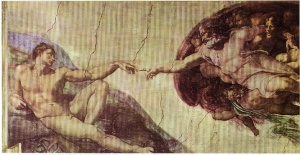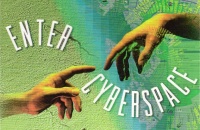Cyberplatonismus (Vorlesung Hrachovec, Winter 2010)
Aus Philo Wiki
Live-Stream (Video und Audio) gibt es wieder Freitags von 10:15-11:45 unter http://webcast.philo.at:8000
Der Video-Stream kann nur mit bestimmter Software angeschaut werden. Jene Media Player, die den Stream übertragen können, sind unter diesem Link zu finden: http://www.icecast.org/3rdparty.php (Media Players That Support Icecast Streaming) Und unter diesem link kann der VLC - Media Player gratis heruntergeladen werden: http://www.videolan.org/
Inhaltsverzeichnis
Bildwelten
Michael Heim über die erotische Ontologie des Cyberspace
The Erotic Ontology of Cyberspace
- Cyberspace is more than a breakthrough in electronic media or in computer interface design. With its virtual environments and simulated worlds, cyberspace is a metaphysical laboratory, a tool for examining our very sense of reality.
- Our love affair with computers, computer graphics, and computer networks runs deeper than aesthetic fascination and deeper than the play of the senses. We are searching for a home for the mind and heart. Our fascination with computers is more erotic than sensuous, more spiritual than utilitarian. Eros, as the ancient Greeks understood, springs from a feeling of insufficiency or inadequacy. Whereas the aesthete feels drawn to casual play and dalliance, the erotic lover reaches out to a fulfillment far beyond aesthetic detachment.
- The computer's allure is more than utilitarian or aesthetic; it is erotic. Instead of a refreshing play with surfaces, as with toys or amusements, our affair with information machines announces a symbiotic relationship and ultimately a mental marriage to technology. Rightly perceived, the atmosphere of cyberspace carries the scent that once surrounded Wisdom. The world rendered as pure information not only fascinates our eyes and minds, but also captures our hearts. We feel augmented and empowered. Our hearts beat in the machines. This is Eros.
- Only a short philosophical step separates this Platonic notion of knowledge from the matrix of cyberspace entities. (The word matrix, of course, stems from the Latin for "mother," the generative-erotic origin). A short step in fundamental assumptions, however, can take centuries, especially if the step needs hardware support. The hardware for implementing Platonically formalized knowledge took centuries. Underneath, though, runs an ontological continuity, connecting the Platonic knowledge of ideal forms to the information systems of the matrix. Both approaches to cognition first extend and then renounce the physical embodiment of knowledge. In both, Eros inspires humans to outrun the drag of the "meat"--the flesh--by attaching human attention to what formally attracts the mind. As Platonists and Gnostics down through the ages have insisted, Eros guides us to Logos.
- The erotic drive, however, as Plato saw it, needs education to attain its fulfillment. Left on its own, Eros naturally goes astray on any number of tangents, most of which come from sensory stimuli. In the Republic, Plato tells the well-known story of the Cave in which people caught in the prison of everyday life learn to love the fleeting, shadowy illusions projected on the walls of the dungeon of the flesh. With their attention forcibly fixed on the shadowy moving images cast by a flickering physical fire, the prisoners passively take sensory objects to be the highest and most interesting realities. Only later, when the prisoners manage to get free of their corporeal shackles, do they ascend to the realm of active thought, where they enjoy the shockingly clear vision of real things, things present not to the physical eyes but to the mind's eye. Only by actively processing things through mental logic, according to Plato, do we move into the upper air of reliable truth, which is also a lofty realm of intellectual beauty stripped of the imprecise impressions of the senses. Thus the liberation from the Cave requires a reeducation of human desires and interests. It entails a realization that what attracts us in the sensory world is no more than an outer projection of ideas we can find within us. Education must redirect desire toward the formally defined, logical aspects of things. Properly trained, love guides the mind to the well-formed, mental aspects of things.
- Cyberspace is Platonism as a working product. The cybernaut seated before us, strapped into sensory-input devices, appears to be, and is indeed, lost to this world. Suspended in computer space, the cybernaut leaves the prison of the body and emerges in a world of digital sensation.
- This Platonism is thoroughly modern, however. Instead of emerging in a sensationless world of pure concepts, the cybernaut moves among entities that are well formed in a special sense. The spatial objects of cyberspace proceed from the constructs of Platonic imagination not in the same sense that perfect solids or ideal numbers are Platonic constructs, but in the sense that inFORMation in cyberspace inherits the beauty of Platonic FORMS. The computer recycles ancient Platonism by injecting the ideal content of cognition with empirical specifics. Computerized representation of knowledge, then, is not the direct mental insight fostered by Platonism. The computer clothes the details of empirical experience so that they seem to share the ideality of the stable knowledge of the Forms. The mathematical machine uses a digital mold to reconstitute the mass of empirical material so that human consciousness can enjoy an integrity in the empirical data that would never have been possible before computers. The notion of ideal Forms in early Platonism has the allure of a perfect dream. But the ancient dream remained airy, a landscape of genera and generalities, until the hardware of information retrieval came to support the mind's quest for knowledge. Now, with the support of the electronic matrix, the dream can incorporate the smallest details of here-and-now existence. With an electronic infrastructure, the dream of perfect FORMS becomes the dream of inFORMation.
- Filtered through the computer matrix, all reality becomes patterns of information. When reality becomes indistinguishable from information, then even Eros fits the schemes of binary communication. Bodily sex appears to be no more than an exchange of signal blips on the genetic corporeal network. Further, the erotic-generative source of formal idealism becomes subject to the laws of information management. Just as the later Taoists of ancient China created a yin-yang cosmology that encompassed sex, cooking, weather, painting, architecture, martial arts, and the like, so too the computer culture interprets all knowable reality as transmissible information.

